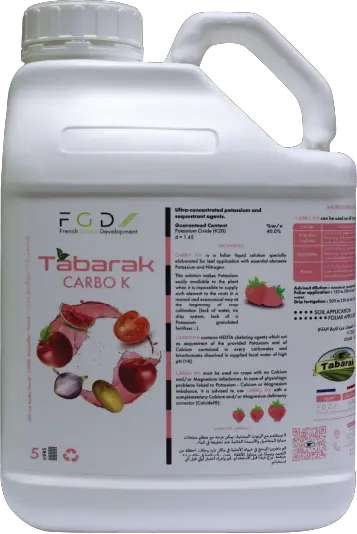Tabarak Carbo K
• 40% Potassium
Key Composition and Benefits
Potassium (K): Essential for fruit development, enhancing size and quality. Potassium plays a crucial role in enzyme activation, protein synthesis, and overall plant health. A deficiency can lead to reduced fruit size, poor quality, and increased susceptibility to diseases.
Tabarak Carbo-K®is a foliar liquid solution specially elaborated for leaf application with essential elements Potassium and Nitrogen.
This solution makes Potassium easily available to the plant when it is impossible to supply such element to the roots in a normal and economical way at the beginning of crop cultivation (lack of water, no drip system, lack of a Potassium granulated fertilizer…).
Tabarak Carbo-K® contains HEDTA chelating agents which act as sequestrant of the provided Potassium and of Calcium contained in every carbonates and bicarbonates dissolved in supplied local water of high pH (>8).
Mechanism of Action
Tabarak Carbo K's effectiveness stems from its readily available potassium formulation. The potassium ions are readily absorbed by the plant's root system, facilitating efficient translocation to the fruits. This improved nutrient uptake promotes cell expansion and division within the fruit, contributing to increased size and improved overall quality.
Benefits of Using Tabarak Carbo K
- Enhanced Fruit Size: Significantly increases the size and weight of fruits.
- Improved Fruit Quality: Leads to better fruit color, firmness, and overall appearance.
- Increased Yields: Contributes to higher overall crop yields.
- Optimized Potassium Absorption: Ensures efficient uptake and utilization of potassium by plants.
- Enhanced Plant Health: Promotes overall plant vigor and resilience.
Frequently Asked Questions (FAQs)
Q: When is the best time to apply Tabarak Carbo K? A: The best time to apply is typically during the crucial fruit development stages. Refer to the product label for specific application timing guidelines.
Q: What are the signs of potassium deficiency in plants? A: Signs of potassium deficiency can include reduced fruit size, poor fruit quality, leaf scorch, and general plant weakness.
